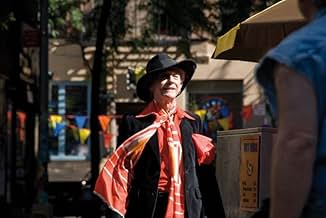The later years of Quentin Crisp's life in New York City.The later years of Quentin Crisp's life in New York City.The later years of Quentin Crisp's life in New York City.
- Nominated for 3 BAFTA Awards
- 5 wins & 8 nominations total
- Young Man
- (as Benjamin Eakley)
- DJ
- (as Craig 'muMs' Grant)
- Director
- Writer
- All cast & crew
- Production, box office & more at IMDbPro
Featured reviews
As a result, more or less the only 'plot event' of the film is the arrival of AIDS in New York, with even that seen largely through the effects on Crisp's career of a single dismissive quip (his reasoned attitude is that making too much of AIDS will only bolster public perception of homosexuals as disease-ridden outcasts, but this doesn't go down well among his target audience). Otherwise, "An Englishman in New York" consists largely of bons mots; little snippets of Crisp performing and delivering his famous lines, whether to an audience of one or to a small studio gathering.
That said, given the limitations of its material the film manages to pull off the difficult trick of its predecessor, presenting its deliberately flamboyant, over-the-top protagonist as a sympathetic human being whose pose we not only condone but find ourselves applauding. I generally shy away from 'gay issues', but find myself feeling here for the people he meets and the prejudice he encounters, both from them and on their behalf. In some ways, it is as hard to be a determinedly effeminate homosexual among the butch 'clones' of an out-of-the-closet New York as among the disapproving middle classes of pre-war England.
John Hurt does an excellent task in portraying the physical aging of the character, and of course it is a great bonus to have the same actor appearing in both films with a genuine generational time-lapse between them. It is just a truism that -- despite Quentin Crisp's much-repeated prediction that every year "things are going to get worse" -- happiness, as the proverb has it, simply doesn't make for such an enthralling story as do troubled times; and this is essentially a depiction of a man who has finally come to terms with the world, and it with him. As such it is well-meaning and pretty well executed, but not a particularly unmissable experience.
And inevitably it is less touching and less striking than its predecessor.
Quentin Crisp was a flamboyant and insightful 'homosexual' who, after spending the first 73 years of his life in not-so-gay, olde England, moved to New York and was embraced by the art and literary communities there. He spoke in quotable soundbites that challenged the world's assumptions, and people's perceptions of each other through the stories he told.
His live performances were more of Q and A between himself and the audience, as he never failed to provide an opinion about any idea presented to him.
This film fearlessly bases it's integrity on John Hurt's performance and he doesn't let anyone down. Having played Crisp previously in a film based on Crisp's own book, The Naked Civil Servant, Hurt "leaves nothing unpacked" in his rendition of Crisp. When I think of Crisp now, I see John Hurt's face.
Story-wise, I found this film very informative about a less-public time in the life of a courageously defiant man who refused to let society keep him in the closet, both in England and the U.S. Finally I got some clarity on why Crisp fell out of favour during the beginning of the AIDS crisis. It's unfortunate that Crisp's analysis of AIDS as a "fad" turned out to be true in some ways. Perhaps the disease isn't a fad, but certainly people's fear and behavioural changes were temporary, as we now see in increasing infection rates of young people. If only his insights weren't treated as simplistic in the midst of panic, or if Crisp had had the fortitude (at 75) to lead a change in attitudes, the fight against this disease might have followed a different trajectory. Unfortunately that was not Crisp's role to play.
If you enjoyed The Naked Civil Servant, you will likely find this film equally interesting. Hurt is remarkable, and Crisp's perspectives are still relevant.
Did you know
- TriviaSir John Hurt also played this character in the television movie The Naked Civil Servant (1975). Quentin Crisp said of Sir John Hurt, that he was his representative here on Earth.
- Quotes
Quentin Crisp: Persistence is your greatest weapon. It is in the nature of barriers that they fall. Do not seek to become like your opponents. You have the burden and the great joy of being outsiders. Every day you live as a kind of triumph. This you should cling onto. You should make no effort to try and join society. Stay right where you are. Give your name and serial number and wait for society to form itself around you. Because it will most certainly will. Neither look forward where there is doubt nor backward where this is regret. Look inward and ask not if there is anything outside that you want but whether there is anything inside that you have not yet unpacked.
- ConnectionsFollows The Naked Civil Servant (1975)
- How long is An Englishman in New York?Powered by Alexa






























